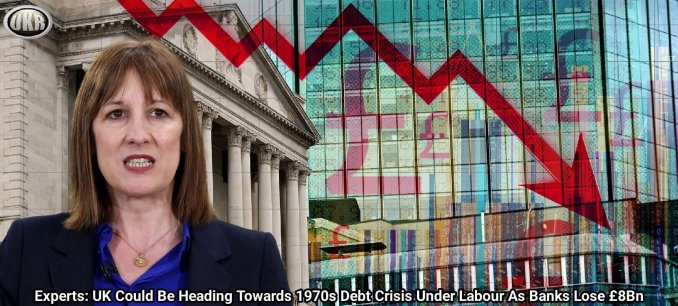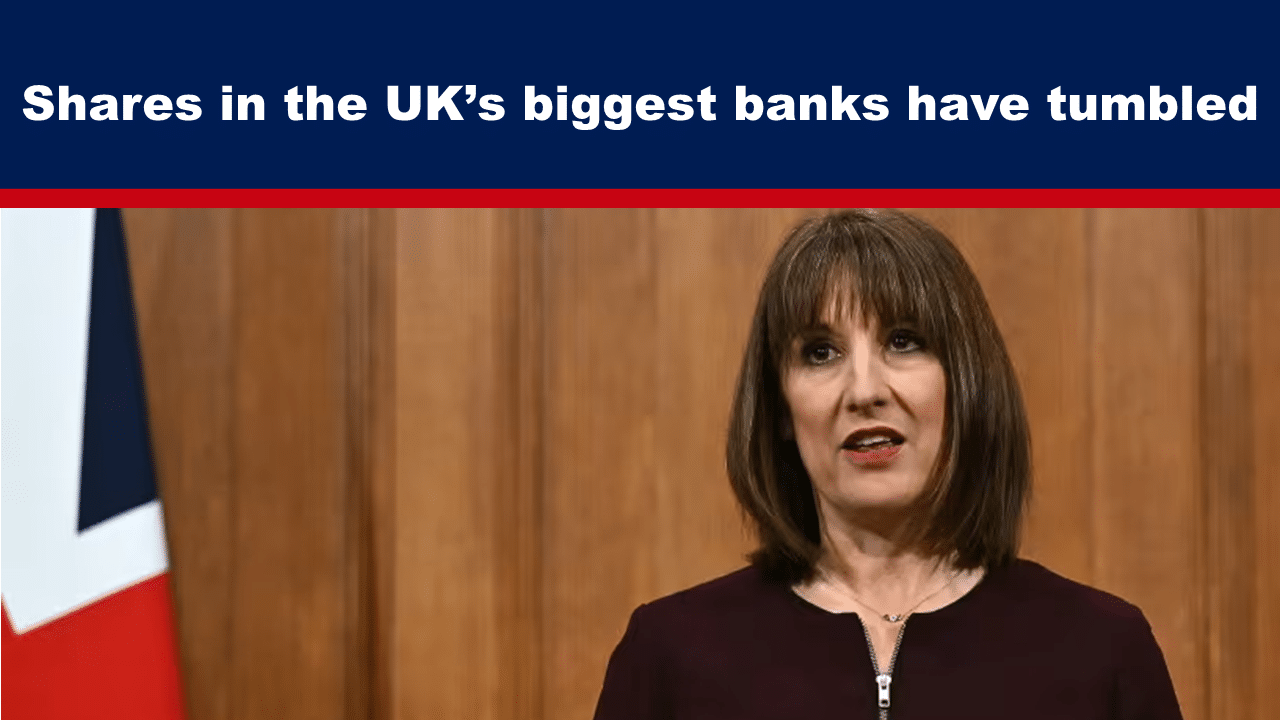
Experts warn UK could be heading towards 1970s debt crisis under Labour as banks lose £8bn

CP
Britain’s biggest banks lost more than £8billion in value today as rumours swirled that Chancellor Rachel Reeves is planning a tax raid on the sector.
Leading economists have warned the UK could be lurching towards a 1970s-style debt crisis and even an IMF bailout.
Shares across the FTSE 350 tumbled by up to 2.3% in early trading, with jittery investors worried the Treasury is eyeing new levies to plug their £50bn black hole in the nation’s finances.
NatWest was hit hardest, down 5.1%, wiping £2.2bn off its market value in a single day. Barclays and Lloyds slumped 3.7% and 4.2% while HSBC dipped 1.3%.
The City sell-off followed talk that banks could be forced to hand over more profits through a levy on the huge cash piles they keep at the Bank of England.
Market watcher David Morrison at Trade Nation said: “Banking stocks are selling off mainly due to fears Ms Reeves could be preparing a new windfall tax.”
Speculation over fresh tax grabs comes just weeks before the autumn Budget, expected to unleash a raft of revenue-raising measures. Back in May, deputy PM Angela Rayner urged Reeves to hike corporation tax on banks, a change they think will raise up to £4bn a year.
But leading economists have warned the UK could be lurching towards a 1970s-style debt crisis and even an IMF bailout if Labour continue down this path.
This article (Experts warn UK could be heading towards 1970s debt crisis under Labour as banks lose £8bn) was created and published by Conservative Post and is republished here under “Fair Use” with attribution to the author CP
See Related Article Below
Shares in the UK’s biggest banks have tumbled
RHODA WILSON
Shares in the biggest UK banks fell sharply today due to fears of a potential tax raid on the sector to help shore up the UK’s public finances.
The market was reacting to mounting fears that the Government will target the banking sector at the autumn Budget with a surcharge on profits or even a new levy to help fill a £20 billion fiscal hole.
Earlier today, The Financial Times published the article ‘UK Bank Shares Tumble On Fears Of Tax Raid On Sector’. The following is a summary of the article; you can read an archived copy of it HERE. As we read this article, we are reminded of recent warnings from Ed Dowd about an imminent global financial crisis.
The share prices of major UK banks, including NatWest, Lloyds Banking Group and Barclays, have fallen significantly today (between 3.8% and 5.3%) due to fears that the government may impose a tax raid on the sector to address the UK’s public finances, with a potential fiscal hole estimated to be at least £20 billion.
The sell-off of banks’ shares followed suggestions of a possible surcharge on profits or a new bank levy as ways to fill the fiscal gap by the think tank Institute for Public Policy Research (“IPPR”). In a report, published today, IPPR has proposed a new levy on profits to recoup “windfalls” made by lenders as a result of the Bank of England’s quantitative easing programme, undertaken following the financial crisis.
In a summary of its report, IPPR described the problem:
After a period of making significant profits on this programme, the Bank of England is now making record losses, which is historically very unusual for central banks. The Treasury is paying for these losses, making the UK an international outlier, and the sums involved are staggering: Bank of England losses will cost the taxpayer £22 billion a year in every year of this parliament.
These losses come from two sources: valuation losses from selling government bonds below purchase value; and interest rate losses.
Fixing the leak: How to end the £22 billion annual taxpayer losses at the Bank of England, IPPR, 29 August 2025
Possibly adding to banks’ nervousness about a tax raid, in a letter to Chancellor Rachel Reeves in May, Deputy Prime Minister Angela Rayner proposed eight potential tax rises, including raising the higher corporation tax rate for banks from 28 per cent to 30 per cent.
Bank executives have warned that increased taxes would damage the government’s growth agenda and have urged against fresh taxes on the sector, stating that financial institutions are already among the biggest taxpayers in the country.
The UK Finance industry lobby group has argued that adding another tax would make the UK less internationally competitive and run counter to the government’s aim of supporting the financial services sector to drive growth and investment in the wider economy.
The potential tax raid on the banking sector is seen as a way for the government to reassure Labour MPs that it is sharing the fiscal pain, with some officials suggesting that an increase in the bank corporation tax surcharge on profits could raise up to £3 billion.
Chancellor Reeves has stated that securing growth is her priority and that she is conscious of the risks of overtaxing the wealthy and productive parts of the economy, but the final decision on tax changes will depend on the size of the fiscal hole exposed by Office for Budget Responsibility forecasts, which have yet to be prepared for the autumn Budget.
Featured image taken from ‘UK bank shares fall on fears of Reeves windfall tax; UniCredit lifts Alpha Bank stake to 26%’, The Banker, 29 August 2025 (behind a paywall)

This article (Shares in the UK’s biggest banks have tumbled) was created and published by The Expose and is republished here under “Fair Use” with attribution to the author Rhoda Wilson

••••
The Liberty Beacon Project is now expanding at a near exponential rate, and for this we are grateful and excited! But we must also be practical. For 7 years we have not asked for any donations, and have built this project with our own funds as we grew. We are now experiencing ever increasing growing pains due to the large number of websites and projects we represent. So we have just installed donation buttons on our websites and ask that you consider this when you visit them. Nothing is too small. We thank you for all your support and your considerations … (TLB)
••••
Comment Policy: As a privately owned web site, we reserve the right to remove comments that contain spam, advertising, vulgarity, threats of violence, racism, or personal/abusive attacks on other users. This also applies to trolling, the use of more than one alias, or just intentional mischief. Enforcement of this policy is at the discretion of this websites administrators. Repeat offenders may be blocked or permanently banned without prior warning.
••••
Disclaimer: TLB websites contain copyrighted material the use of which has not always been specifically authorized by the copyright owner. We are making such material available to our readers under the provisions of “fair use” in an effort to advance a better understanding of political, health, economic and social issues. The material on this site is distributed without profit to those who have expressed a prior interest in receiving it for research and educational purposes. If you wish to use copyrighted material for purposes other than “fair use” you must request permission from the copyright owner.
••••
Disclaimer: The information and opinions shared are for informational purposes only including, but not limited to, text, graphics, images and other material are not intended as medical advice or instruction. Nothing mentioned is intended to be a substitute for professional medical advice, diagnosis or treatment.
Disclaimer: The views and opinions expressed in this article are those of the author and do not necessarily reflect the official policy or position of The Liberty Beacon Project.






Leave a Reply